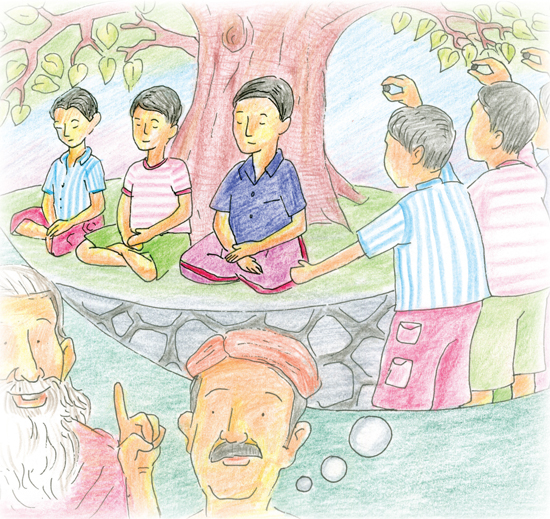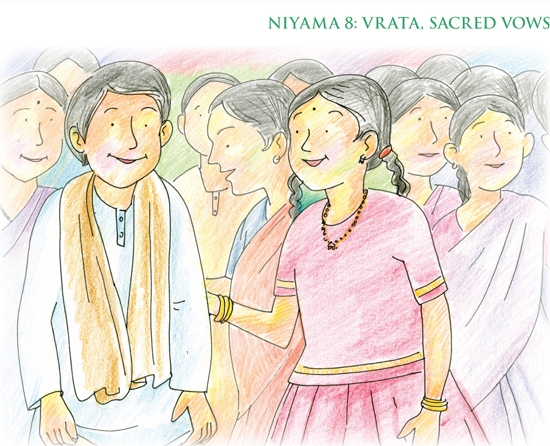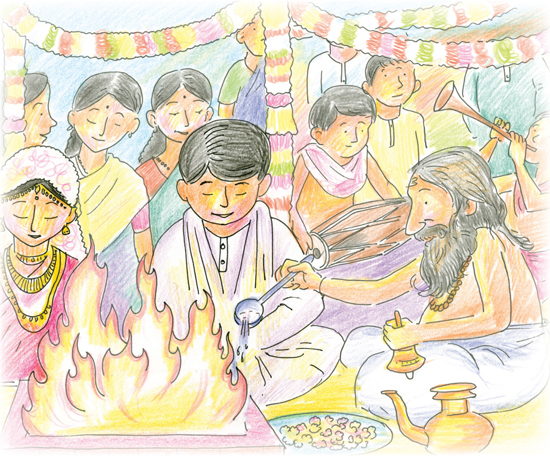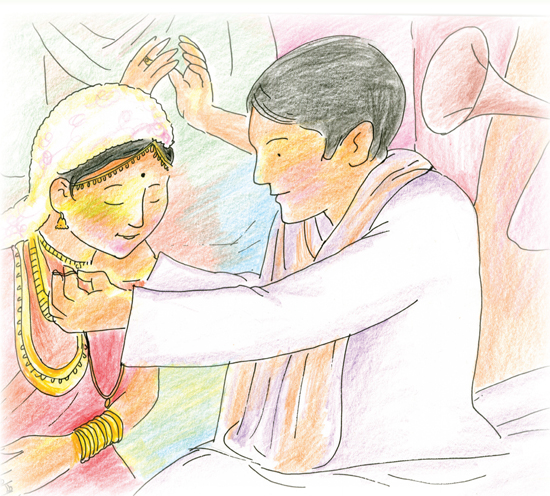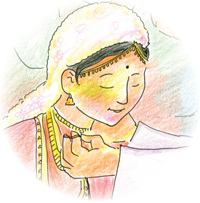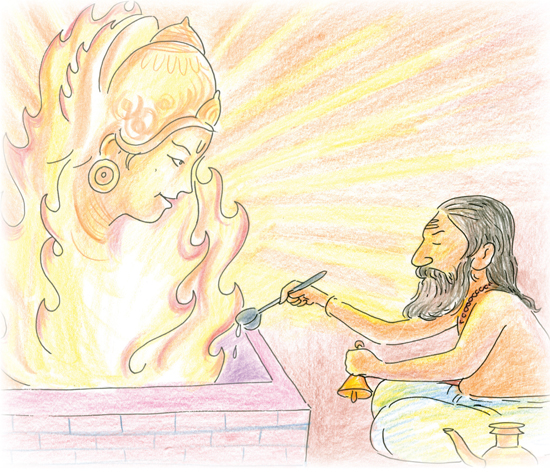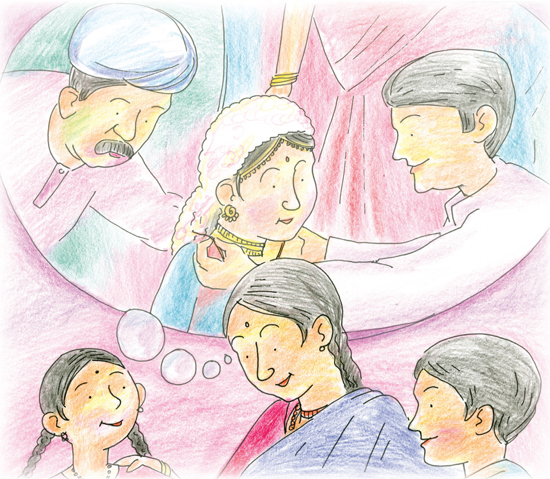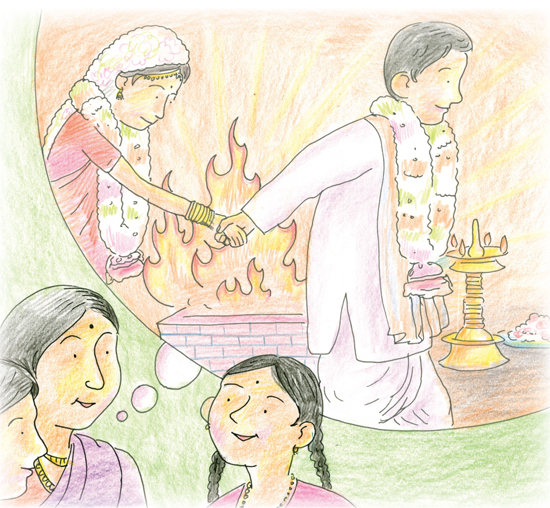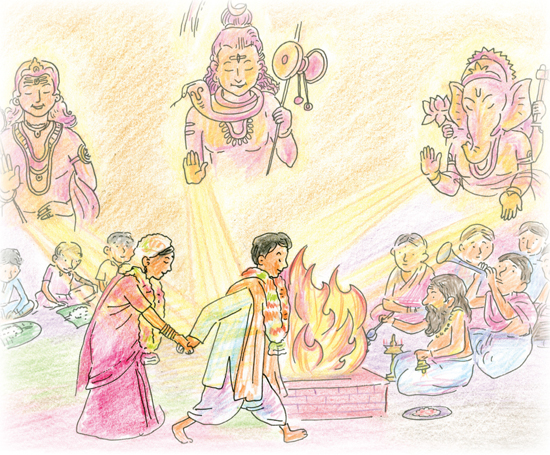Taking Divine Vows
Guhan and Meenakshi watched the festivities, the fun and frolic, with wide-open eyes. Anjali, their older cousin, was getting married, and the ceremony had just begun. Guhan looked at Meenakshi and said, “Sis, you look different in that fancy skirt and blouse.”§
Meenakshi smiled. “Yes, I know. I love this mehendi and the glass bangles, too. They make me feel like a grown up!”§
“I wish my outfit made me feel like a grown-up whined Guhan, “This kurta is too tight and I’m afraid the dhoti will fall off at any moment.”§
Meenakshi laughed, “That would be funny, wouldn’t it?”§
“What?” asked Guhan in mock anger.§
“Yeah. The crowd would stop looking at the wedding and stare at you,” joked Meenakshi.§
The teasing had a touch of innocence, as the two children were only twelve and eleven years old. But it was fun. As they continued to chide each other, the musicians began playing their instruments. The royal sound of the nadaswaram horns merged with the rhythmic, pulsating beat of the tavil drums. The sound had an urgency to it, while it added a sense of richness to the event. The smell of jasmines, marigolds, lilies and other flowers mingled with the scent of the incense. In front of the musicians was the marriage pandal, where the bride and groom were seated. Two priests sat beside the fire. Cousin Anjali and her future husband, Dhiraj, sat facing the sacred fire.§
“Doesn’t she look beautiful?” asked Meenakshi, staring at her cousin, who was dressed in a gorgeous red and gold sari and adorned in gold jewelry.§
“Yes, but Dhiraj looks uncomfortable in his fancy suit. I hope Mother doesn’t force me to wear one of those for my wedding. It looks so silly. I once saw a bride and groom with flowers hanging in front, covering their faces. Why was that?”§
“That is because in some traditions the bride and groom should not see each other’s face till the wedding is over,” replied Meenakshi, feeling proud to have known the reason. “And for your information, nobody forced Dhiraj to wear that outfit! He chose it himself. Anjali told me he couldn’t wait to wear it. I think he looks handsome and majestic!”§
“I think our Hindu weddings are a bit much. Why should we spend so much and make such a fancy and expensive fuss? And all these rituals!! Look at that priest pouring ghee into the fire. The smoke is making their eyes water.”§
Meenakshi was quiet for a moment. While she didn’t fully understand the wedding rituals, she knew in her heart that there was something larger than life happening here—something sacred and beautiful. It could be the fragrances, the flowers, the grandly dressed people, the music—it could be any of these or all of it put together. But whatever it was, it made the ceremony beautiful and precious.§
Suddenly the tempo rose as, under a shower of turmeric rice and flowers, the groom gently tied the yellow thread with the gold wedding pendant, called the mangala sutra, around the girl’s neck.§
“There he goes. Tied for life!” said Guhan.§
“Stop it. Don’t be so cynical!” said Meenakshi angrily, “It’s a wonderful thing to get married.”§
Guhan laughed, and the two watched as the couple got up. With the groom in front, and the bride following him holding hands, they walked around the fire slowly. They circled the blaze seven times and then sat down.§
“I wish someone would explain this to me,” said Meenakshi, just as her mother walked up to them.§
“Guhan, Meenakshi, are you enjoying the wedding?”§
“I love it! But this cynic here is criticizing it,” complained Meenakshi.§
Guhan smiled, “I’m just having some fun. But really, this looks great. I mean a wedding like this is so earnest that I believe the two of them will carry this memory all their lives. It’s so, so spiritual? I’m not sure that’s the right word.”§
Their mother beamed, “Yes our wedding ceremonies are very spiritual. Every part of the ritual has a mystical meaning to it.”§
Meenakshi saw an opening: “Amma, can you explain the reason for the fire?”§
“Yes. Fire in Hinduism is sacred. By pledging in front of the fire, the couple are declaring their vows to Agni, the God of fire. They are voicing their commitment to stay together all thro life. Agni is also the messenger God. He takes the news of the wedding to all the other Gods.”§
“Wow! That’s pretty serious,” said Guhan soberly.§
Mother agreed, “Yes, any vow is serious, isn’t it? Once you make a promise or take a vow before God, you commit to standing by it. Have either of you made any commitments?”§
“I made commitments on April 14, Tamil New Year’s Day, which I promptly forgot,” confessed Guhan.§
“That happens. But if couples forgot about their marriage vows and didn’t stay together, what would happen to the family and children? It wouldn’t be funny, would it?” asked mother seriously.§
“Did you also go through this kind of a wedding, Amma?” asked Meenakshi.§
“Yes, dear. And though so many years have gone by, I can never forget the moment when your father tied the mangala sutra around my neck. Until then I had not realized what a big step in life it was to get married. I just thought that it is another small step in my life. It was at that moment that I realized that it is not a small step. It’s a big commitment, which requires respect, friendship, forgiveness and, most of all, love.”§
“Ma, why do the couple walk around the fire?” asked Guhan.§
“That also has meaning. Every time they go around the fire, they make a different vow in front of Agni. With the first round the couple vow together to earn a living and provide for their family. They also promise to avoid any activities that might hurt their marriage.§
“On the second round they vow to build their physical, mental and spiritual powers, which will help them lead healthy lives. “The third vow is about material things. They will earn and increase their wealth, but only by righteous and proper means.§
“As they go round the fire the fourth time, they promise that they will acquire knowledge, happiness and harmony by mutual love, respect, understanding and faith.§
“The fifth round is taken to seek God’s blessings to have children. The couple makes a promise to take care of their God-given children in a responsible way, so that they grow up to be healthy, righteous and brave.§
“The sixth round is for self control and long life.§
“The seventh vow is to be loyal to each other and remain life-long companions in marriage.”§
“Gosh, I never knew there was so much meaning to that ritual,” said Guhan. “Amma, do you think it is necessary to take such vows? I mean, when a couple gets married, isn’t all this already understood?”§
“That’s a good question. Yes, when two people decide to get married, all these things are understood in a general way. But if they are stated as a clear, formal vow, with God, family and friends as witnesses, then it creates a stronger commitment. Plus, difficulties can arise over time, and that is when they need to remember their promises to God and the Gods.§
“The marriage ceremony blesses the couple and gives them the strength to overcome any problems. Can you carry a heavy brick in a flimsy cloth? The cloth will tear, won’t it? But a cloth that is well woven with strong thread will be able to carry the weight. It is the same in marriage. If it is built on a set of flimsy commitments, it will break down. In Hindu communities, a wedding is a lifetime commitment— not only towards each other, but towards society, their children, their extended family and God. By fulfilling this commitment, both husband and wife will grow spiritually and the community will prosper.”§
“Mother, all this deep talk is making me hungry!” said Meenakshi.§
“Then let’s join everyone for a delicious lunch,” said Amma with a grin as she led them to the reception hall.§
